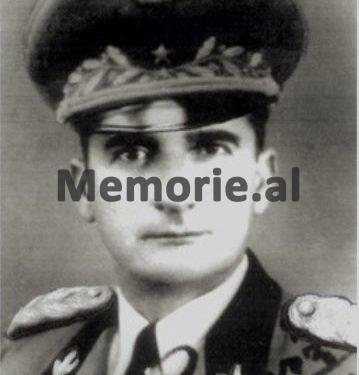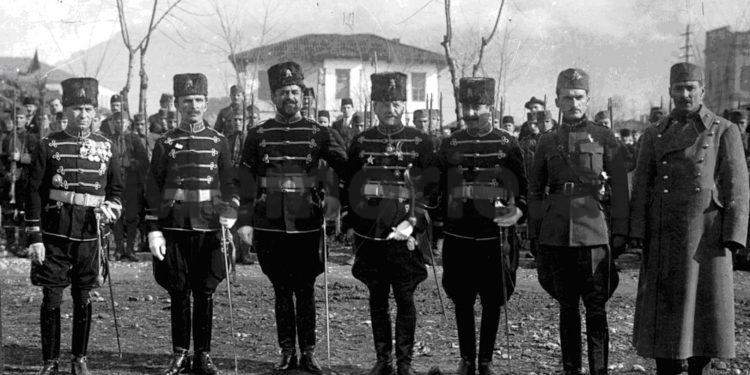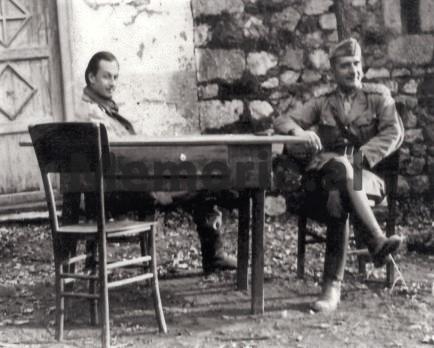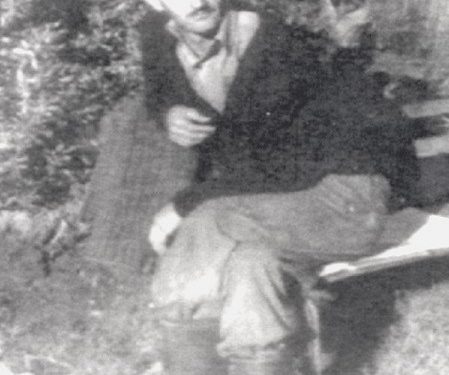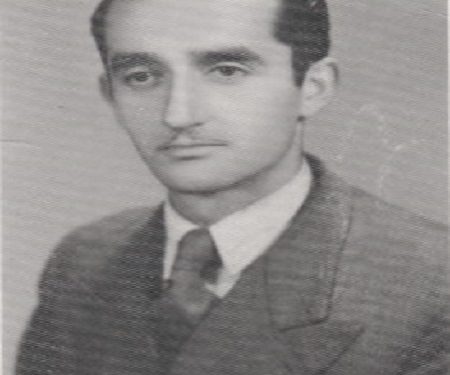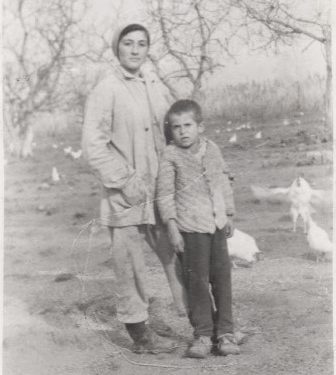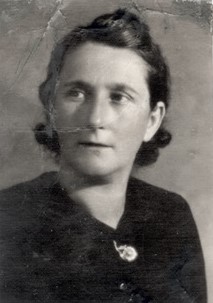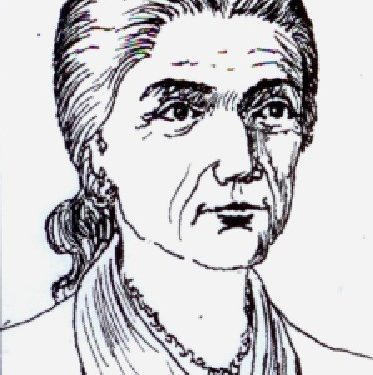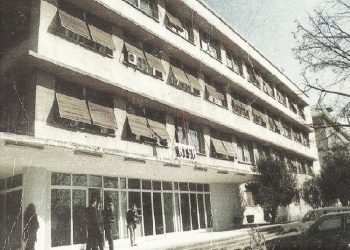From Lek Pervizi
Part thirteen
THE ODYSSEY OF INNOCENCE
To my brother Valentin, who for 47 years straight,
endured the ideological storms of communism,
and what’s more, separated from his wife,
a true Odysseus in the middle of the twentieth century.
Memorie.al/As you enter Skuraj and cross the Urdhazës stream, the mountainous climb begins, across the hill called Lekbibaj. You pass three mills, known as Gjin Pjetri’s mills, which stand one after the other. You also pass the two-story tower of Ndrec Pjetri, Gjin’s younger brother, and then you come across a rocky ridge on which stands a complex of three stone buildings, the historic towers known as the towers of Gjin Pjetër Pervizi of Skuraj, the leader of the Kurbin uprising. These buildings dominate the entire valley formed by the joining of the Mat and Fan rivers (a branch of the Mat), all the way to Milot. It is almost a fortress that guards and protects the land from the expeditions of foreign invading armies that could penetrate that gorge, until they were met by the wall of the Skuraj Mountains, where the aforementioned towers stood.
Continued from the previous issue
Internment in Berat
A few days later, the director called him to his office, where he greeted him kindly and with a smile, told him to get ready, as he might be leaving for Berat the next day. He added that there he would find his grandmother and mother, who would surely be very happy. “I hope you are pleased, aren’t you?”
“Yes, Mr. Director, I don’t know how to express my joy, thinking that I will meet them outside the prison walls and after five years of separation from them.” And in fact, the next day he left, accompanied by a policeman who behaved well along the way, unlike some other arrogant and swaggering ones, who made people like Valentini angry with their harsh behavior, to show that they were connected to the party and fought those who were against it.
The policeman escorted him to the Internal Branch of Berat. When he arrived there, he noticed some mean faces of the Sigurimi, in officers’ uniforms. They had been notified by phone about his arrival, and had come out to see him, and at that moment all the others came out of their offices, as if he were an extraordinary person. The officer, who dealt with the internees, after he had registered his data, told him that he would have to report to the Branch twice a day, in the morning until nine o’clock and in the evening, until 19:00.
When Valentini came out of the office, in front of the Branch, some people approached him, asking him who he was and where he came from. Valentini understood from their speech and appearance that they were internees from the north. He told them he came from Shkodra and who he was, and that there in Berat, he had his grandmother and mother. They were very happy and after they told him who they were, they congratulated him on his release from prison. Meanwhile, a young boy, separated from them, to inform Valentini’s mother. So they all left together. After a while, he met his mother on the way, who had come out to greet him, as soon as she heard of his arrival. An emotional meeting, after five years of separation. Tears of joy were not missing.
They greeted their companions and headed towards the apartment where his grandmother was waiting impatiently. The meeting with the grandmother was even more emotional; she hugged him and touched him on the body as if to convince her that it was him, her beloved grandson. The apartment they had been given in Berat, was completely ruined and located above a stable. A room of 14 square meters, without a ceiling and with a roof where tiles and rafters were missing.
So the rain dripped everywhere. The floor was also broken and some planks were missing. The wind came from all four sides, because the walls were cracked and in some places without bricks. So in those first days, he had to make some repairs himself, with the rubble that had been left from the war that had also passed there, where his new friends, the internees, also helped him. Thus he somehow fixed the small room.
This city, known for its antiquity, where the castle with its powerful walls, with old churches, where icons, mosaics, and books were preserved, even the famous code with golden letters, the communist regime had designated as an internment center, for large families and many others from the northern regions. Many of these families also stayed in the castle neighborhood, as well as other neighborhoods, such as “Mangalemi.”
The families and individuals were interned because of their family members who had fled to the mountains, or abroad. When they were killed or caught, their families were released. But there were some families, which were called great and important, who were never released, even when their people were killed or died. Since the city was damaged by the war, the destroyed dwellings were given to the internees for shelter, who tried to settle in those half-ruined buildings.
The Command was quite far away, on the other side of the city, and yet both the mother and the grandmother had to report twice a day. This for the grandmother, an 85-year-old woman, was a torture. So with nothing to sustain them, they struggled with the corn bread ration they had been given, one kilogram of bread a day. This amount of bread was given to them to compensate for food shortages. They sold half of it to the people of Berat, who also suffered from bread shortages, due to the food crisis that the country was going through, and had a ration of 400 grams per person.
There was a great bread crisis, because all the agricultural lands had been left uncultivated for two years. So much so that UNRRA intervened, with flour supply, to cope with that shortage. The other internees also acted this way, as the communist regime had deported them from their places and properties, without allowing them to take anything with them. With those few coins from the bread, they tried to push forward in that hopeless situation, where they had been oppressed.
With his arrival in Berat, Valentini had the opportunity to send two postcards to his wife in Bologna, where he informed her that he had been transferred from Shkodra to Berat, where he had reunited with his grandmother and mother. He used postcards, because he knew that letters were strictly censored by the Sigurimi. Luckily the postcards had arrived there, because after a month he received a reply, also with a postcard, where his wife expressed her joy for his transfer to Berat, where he had reunited with his family.
Thus, a certain possibility opened up, for the couple to communicate, even superficially, that they were well, where the hope of an improvement in the situation that would enable Gori’s arrival in Albania was not missing. These were more wishes and dreams, because the reality was too hopeless in that direction. Those who thought that the situation would calm down after the initial storm, which had caused all those massacres and destructions, would be disappointed, because the terror would continue mercilessly, with and without trials, constantly planting other victims, among the best layers of the population.
Valentini, after spending two years in prison, was sentenced to three years of internment in Berat, where he reunited with his grandmother and mother. Interned in May 1945 in Berat, and then in 1948-1954, in Tepelena, where the grandmother died in 1950, at the age of 90, after 5 years of internment, and the mother, after 32 years of internment, died in Pluk of Lushnja, in April 1977, at the age of 77, after 32 years of internment.
A Retrospective Look
We must do an analysis, or rather, take a retrospective look, that is, go back, precisely to the time of the capitulation of Italy, which marked the arrival of the Germans in Albania, to give meaning and to clarify the events that accompanied that period, and which are related to the story about Valentini and his family.
As an accurate and conscientious witness who has followed and experienced those circumstances, I say that my story will serve to clarify many things, which have been presented as something else, that is, upside down, or have been deliberately deformed and manipulated, for dark clan, regional, religious, and ideological interests, since I have it ingrained in my brain, to present the events from a perspective that is as real and accurate as possible.
I hate writers who grovel for the purpose of material or moral privileges, which turn into followers and hymn-makers of individuals, parties, clans, regions, and beliefs, reaching disgusting fabrications and fictions, which are included in the term of deliberate “falsification” of Albanian history.
There have been cases where even so-called figures and personalities of the Albanian world have deliberately falsified historical facts, well known, with their stories, taking advantage of the name and titles they hold and held. This would be one of the greatest outrages done to our history. We will have a chance to return to this conversation, but let’s continue with what we have started.
When, on September 8, 1943, the capitulation of Italy was announced, on that very day my father, General Prenk Pervizi, together with some other senior officers of the Albanian Army, among them Generals Gustav Mirdashi and Aqif Permeti, and a couple of colonels, appeared at the Italian Army Command, where they had a meeting with the commander-in-chief of that army in Albania, General Dalmazzo.
In that meeting, my father, on behalf of the Albanian Army, informed him that they had come to take over the Command. General Dalmazzo was asked to issue an order to the Italian garrisons, to surrender with all their armaments, to the effective forces of the Albanian Army, or to those of the mountain, so as not to provoke incidents and bloodshed, since the Italian occupation in Albania had ended.
Albania already felt free and independent. Dalmazzo undertook to do that work. Meanwhile, my father intervened by advising him to take as many Italians as possible with him on the ships they had, because the Germans could take revenge on them for the betrayal that had been done to them. Dalmazzo had thanked the Albanians for their nobility, and on that occasion he had offered as a gift and a souvenir to my father, his two white horses, as a sign of respect for his Albanian colleague, who had behaved so nobly towards him and the Italian command. My father had refused the offer. Thus, the Italian command handed over the offices and the command building, where the Albanian command took its place, with my father at the head.
This was the first act carried out by the Albanian Army, which is not mentioned historically, because historians with titles and ties, seek written documents, which were not made, but which were effectively carried out with oral agreements, trust and bravery. In this case, the main witness was my father, along with other senior officers, and the event was known at that time by everyone, while I, the son, was in Tirana myself, and fully aware of what was happening. It must be emphasized that the surrender of the Italian army was done without problems, according to the agreement that was reached for the peaceful surrender. Thus, the surrender of the Italian army must be understood, and not as it has been presented by the communists and other political forces.
It is so true, because an incident happened in Burrel a few days before the capitulation, when the Italian forces had the opposite order, not to surrender and to respond with fire to any attempt at attack by the Albanians. The people of Mati, incited by who knows who, united and attacked Burrel, where they were met with machine gun fire and cannon shots, which wreaked havoc on them, and they fled in fear and disarray, leaving the dead and wounded. So, we emphasize, that some events of that time, must be viewed and presented within the framework of the truth.
And the truth may be delayed, but one day it will come to light. I hope that this light has come, when the history of Albania is written accurately and without being imposed and manipulated, and not as it has happened so far. While my father with some other officers, among them Generals Gustav Mirdashi and Aqif Permeti, as well as Colonels, Fiqri Dine, Hysni Dema, Tahsim Bishqemi, Sami Koka, etc., sought to organize the Albanian Army as soon as possible, unpredictable events became an obstacle. The word had spread that General Prenk Pervizi, had gone to the mountains (where?) and was calling on the detachments of the northern areas to join him.
All the detachments were disbanded, returning after their officers to their respective regions, after looting the depots of the Italian army, taking materials and armaments. My father, we were notified and alarmed, wanted to intervene but found him in front of a fait accompli. I myself remember, when officers and soldiers came one after another to us in Laç, among them some officers, our friends and cousins, such as; Dod Bardhoku, Mark Doçi, Mark Doda, Ndue Lala, Mark Arapi, Rustem Martini, etc., asking where they should go, to join the general.
They were forced to return to their homes in Mirdita, and other regions. That job came out “ragged,” as the people say. Thus, within a few days, the country was left without an army. Only in Kosovo, two Albanian regiments that were deployed there, had not been disbanded. This was called a tactic of the communists, for the disorganization of the Albanian Army, which otherwise posed a great danger to them. This is because the nationalists, who were now taking power into their hands and with a strong army, would not leave a way for the communists to fulfill their pro-Slavic goals, and would never allow either the communists to take power, or the surrender of Kosovo to Yugoslavia.
It was also said that the English might have a hand in this, also, so as not to allow the creation of a regular and strong Albanian army, which on the one hand, would put the English mission out of the game, when a nationalist government would be created that would rule the country and would fight for national unification, which was in the program of all nationalist forces and parties. On the other hand, Kosovo and Dibra e Madhe, would remain within the Albanian ethnic borders. This did not suit the English, who had promised Kosovo to Tito, from the very fact that Churchill had sent his son on a mission near Tito’s staff.
While the previous English mission, with Colonel Bill McLean and the other officers, had been sent to Albania. The creation and strengthening of an Albanian national army, for the English would be a disappointment and a failure of their policy, pro Tito’s Yugoslavia. Under these circumstances, my father and his collaborators decided to reinforce the army of Kosovo, which as we said, had not been disbanded. He was appointed Minister of National Defense. This duty gave him the necessary and absolute authority in the military field. As we know, Kosovo and Dibra e Madhe, were included in Yugoslavia, according to the decisions of the Ambassadors’ Conference of London in 1913 and the treaty of Versailles in 1919, although it was known that those territories were Albanian and inhabited by Albanians.
As it seems at that time, the Great Powers that were called by the Albanians “The Seven Kings,” in that London conference, had only one problem, that of supporting and satisfying Yugoslavia at all costs, at the expense of smaller and weaker countries. Albania, had just emerged from the 500-year Turkish occupation, and was barely on its feet and had no support, while it had many enemies, who wanted to wipe it off the face of the earth, either by force or by the games and tricks of European diplomacy.
It was its fate that an American president like Wilson came out, who did not allow its final dismemberment. Returning to the decisive period of 1943, my father along with some other patriots, such as; Mehdi Frashëri, Anton Hatapi, Lef Nosi, Mitat Frashëri, Fiqri Dine, Hysni Dema, Rexhep Mitrovica, Ibrahim Biçaku, Muharrem Bajraktari, etc., thought that with the end of the war, the nationalist government would do its best to keep Kosovo, starting from the armed forces, to the implementation of the “Charter” of the United Nations, for the self-determination of peoples.
But to preempt the possibility of diplomatic failure, they decided that in Kosovo, the contingent of troops should be reinforced, to take charge of the defense at all costs, of the ethnic borders. This burden fell to the Ministry of Defense and my father, was engaged with all the possibilities and authority he had, at the head of the Albanian National Army.
Under these conditions, the Germans appeared, who with the capitulation of Italy, came and took its place, with General Neubacher, Minister for the Balkans, who in the first intervention he made, declared that Germany recognized Albania as free, independent and neutral. The Albanians were to continue their work, for the governance and administration of the country. The Germans would not interfere in their affairs, because they only sought transit through Albania and nothing else.
This is so true, that they did not interfere in the affairs of the Albanians, knowing that there was no family that did not keep Italians left in Albania in their homes, and no Italian was killed or arrested by them, mainly in the north. The same thing must be said for the Jews, who did not suffer any persecution and Albania remained as the only country in the world, where the holocaust against the Jews was not implemented.
Surely because the nationalist government had taken measures for their security, by providing all those who were and those who came with Albanian documents, not with a charity campaign, but with official decisions, by word of mouth and in writing. This also came from the reason we mentioned, that the Germans respected the self-governance and self-administration of the Albanians, since they had recognized their freedom, independence and neutrality. What we said, is reinforced by the fact that telephone and telegraph cables were opened with Europe and even with America.
For those who may doubt, we have the fact that my father, had a property purchase problem, where the owner was a friend of his in America, since the time of Zog, with whom he connected, spoke and solved the issue. This is how others had acted who were able to connect with their people in the USA and elsewhere. I am more than convinced that for many readers, these statements are unheard of by them, but they have their own importance, to show what the situation was like in Albania at that time. Not only had that, but a kind of democracy reigned, unseen until then. The press wrote freely, and writers could publish works, which in the time of Italy could not be published.
The communists circulated freely in Tirana, where they made their propaganda, with leaflets and speeches, without anyone bothering them. I myself had met young students and communists of my age on the street, talking as if we were in England. What were called assassinations, anyone could do them, so freely people went and came to their jobs without anyone checking them. But why then is that period of “occupation” spoken of so badly?! Well, this is just the bell of the communists ringing, to justify their coming to power, and it was not allowed nor is it allowed even today, for the other bell of the nationalists to be heard.
Through their press, school books, and the works of writers, collaborators, conformists, and sycophants, as well as through film, theater, artistic works, painting, and sculpture, and other cultural-artistic performances, the communists managed to create a heroic and patriotic image, which did not exist, according to the saying of a great writer like Voltaire, that a repeated lie becomes the truth. Thus the communist regime, which applied such propaganda of slanders, falsifications, lies, and deceptions, officially presented in schools, universities and academies, and cultural-artistic activities, for half a century, created a completely deformed and falsified history, which unfortunately is swallowed, as the truth.
In this case, you feel sorry for the young intellectuals, who fall into that trap and do not seek to investigate further, while there is still time, because later it will be very difficult for them to remove from the Encyclopedia, among others, figures like; Lenka Çuko, Muho Asllani, and criminals like Aranit Çela, Josif Pashko, Shefqet Peçi, etc., with their friends, presented as heroes, and who had not left a crime uncommitted, on the most chosen heads and the best sons of Albania, not to mention that the Kosovars were sawed with a rusty saw, as they themselves boasted.
To boast that you kill and torture people, are a trait only of criminals, such were the majority of those who are called veterans of the war today, murderers and executioners, who boast about the medals they wear on their chest, for the heroism of their crimes, because for fifty years, Albania did not fight with anyone. And the main war of the communist system was the “class war”, and those medals smelled of blood, victims, and torture.
How false and falsified they have written history, the communist academy with its historians, this is very clear from the 1985 encyclopedic dictionary, where it is written that in the Battle of Tirana, 3000 Germans were killed?! Neither seen nor heard of! I, the author of this book, today 96 years old, have lived through that time myself. In Tirana in the years 1943-’44, not a single German was killed. When the communists entered Tirana, on November 17, the Germans had left 20 days earlier (on October 27), without a thorn in their foot.
Thus with this fact, the history of the communists, is sealed with the shame of falsification. The new generations, are careful not to fall into this swamp of deceptions. As we said, this was a retrospective intervention, how events unfolded that brought the communists to power. Where Valentini and his wife, came precisely at that time, as if it were something programmed or ordered! /Memorie.al




